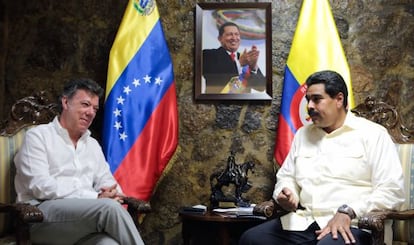Relations with Venezuela widen gap between Colombia’s contenders
But opposition leader Oscar Iván Zuluaga may have to soften his rhetoric if elected on Sunday

Supporters of Óscar Iván Zuluaga warn that Colombia runs the risk of becoming a Castro-Chávez construct: an authoritarian regime that persecutes the opposition and draws inspiration from the Cuban dictatorship. That is, unless their candidate wins the presidential runoff this coming Sunday.
If he does, it will mean the end of the “accomplice silence” that the incumbent, Juan Manuel Santos, is keeping with regard to the deteriorating situation in Venezuela. Zuluaga has pledged to be “firm in the defense of democracy” if he wins the presidency, and said that there is no freedom of expression or entrepreneurial freedom in the neighboring country.
If the government’s peace talks with the FARC guerrilla group is the biggest dividing issue between the two contenders to the Colombian presidency, bilateral relations with Venezuela ranks as their second-most-important source of conflict. That is why the outcome of Sunday’s vote will have an impact on regional politics.
Colombia and Venezuela have always had an intense relationship, with its highs and its lows. On his third day on the job after taking office in 2010, Juan Manuel Santos met with then-Venezuelan leader Hugo Chávez in the Colombian city of Santa Marta, where both leaders decided to take up relations again. Santos described Chávez as “my new best friend.”
Colombia needs, more than any other country, good neighborly relations because of its security problems” Socorro Ramírez, analyst
This statement shocked Santos’ political mentor, Álvaro Uribe, who was in office between 2002 and 2010. Uribe, a rallying figure who took a strong stand against talks with the guerrillas, had believed that Santos would simply carry on with his own policies.
During his last two years in office, Uribe was caught up in a fight with Chávez, whom he accused of sheltering FARC guerrillas on Venezuelan territory. The situation nearly derived into an armed confrontation, but before that, Uribe had in fact had a “very smooth, flowing relationship” with the Venezuelan leader, explains Socorro Ramírez, a lecturer in international relations at National University. “That is why it’s a bit unwonted for Santos to be accused of being a chavista,” she notes.
In the last four years, Santos has developed a pragmatic relationship with Colombia’s neighbors. The first item on the agenda was Venezuela, which shares a 2,000km border with Colombia.
“There is a massive smuggling problem there due to a lack of government presence on both sides,” explains Ramírez. “We’re talking about drugs, weapons, guerrilla fighters and gasoline: on one side of the border you’ve got the cheapest gas in the world, and on the other side the most expensive.”
Santos’ diplomatic U-turn and renewed relations in 2010 led to less meddling in each other’s internal affairs, joint operations against drug rings and armed groups along the border, and a new role for Venezuela as an aide to the peace process with FARC.
When it emerged on Tuesday that the Colombian government and the National Liberation Army (ELN), the country’s second-largest guerrilla group, have also begun preliminary peace talks, Ecuador immediately volunteered to host the negotiation, much as Cuba volunteered to host the talks with FARC.
Colombia and Venezuela have always had an intense relationship, with its highs and its lows
Only six years earlier, Santos had been the Colombian defense minister who sent his army into Ecuadoran territory to kill FARC leader Raúl Reyes. Quito then claimed a violation of its own sovereignty.
Now, Chile, Cuba, Ecuador and Brazil – all of whom seek greater influence as regional mediators – have joined the list of countries who support the peace efforts.
“Colombia needs, more than any other country, good neighborly relations because of its security problems,” says Ramírez. “Also because of its economy: it sells most of its manufactured goods to Andean countries. If Zuluaga leads a regional reaction against [current Venezuelan president] Nicolás Maduro, he will only manage to isolate Colombia again. The other countries do not wish to get involved in this problem – not Brazil, not Chile, not Peru, not even the United States, which sees no use in sanctioning Venezuela.”
The outcome on Sunday will greatly determine the future of the peace process and Colombia’s international role. People like the analyst Pedro Medellín believe that Zuluaga’s belligerent rhetoric towards chavismo is more typical of a candidate than a president.
“If Zuluaga is elected, he will have to adapt and lower the tension, because his neighbors and his membership in Unasur will mark out a path for him to follow,” he says. “But if he persists, he could end up isolating Colombia.”
Tu suscripción se está usando en otro dispositivo
¿Quieres añadir otro usuario a tu suscripción?
Si continúas leyendo en este dispositivo, no se podrá leer en el otro.
FlechaTu suscripción se está usando en otro dispositivo y solo puedes acceder a EL PAÍS desde un dispositivo a la vez.
Si quieres compartir tu cuenta, cambia tu suscripción a la modalidad Premium, así podrás añadir otro usuario. Cada uno accederá con su propia cuenta de email, lo que os permitirá personalizar vuestra experiencia en EL PAÍS.
En el caso de no saber quién está usando tu cuenta, te recomendamos cambiar tu contraseña aquí.
Si decides continuar compartiendo tu cuenta, este mensaje se mostrará en tu dispositivo y en el de la otra persona que está usando tu cuenta de forma indefinida, afectando a tu experiencia de lectura. Puedes consultar aquí los términos y condiciones de la suscripción digital.








































